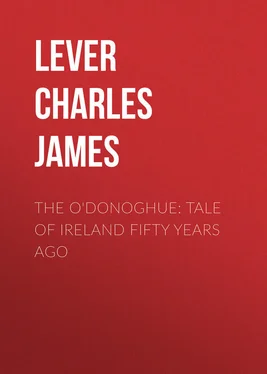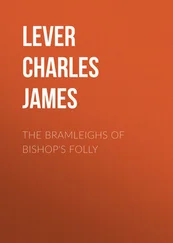Charles Lever - The O'Donoghue - Tale of Ireland Fifty Years Ago
Здесь есть возможность читать онлайн «Charles Lever - The O'Donoghue - Tale of Ireland Fifty Years Ago» — ознакомительный отрывок электронной книги совершенно бесплатно, а после прочтения отрывка купить полную версию. В некоторых случаях можно слушать аудио, скачать через торрент в формате fb2 и присутствует краткое содержание. Издательство: Иностранный паблик, Жанр: literature_19, foreign_antique, foreign_prose, на английском языке. Описание произведения, (предисловие) а так же отзывы посетителей доступны на портале библиотеки ЛибКат.
- Название:The O'Donoghue: Tale of Ireland Fifty Years Ago
- Автор:
- Издательство:Иностранный паблик
- Жанр:
- Год:неизвестен
- ISBN:нет данных
- Рейтинг книги:4 / 5. Голосов: 1
-
Избранное:Добавить в избранное
- Отзывы:
-
Ваша оценка:
- 80
- 1
- 2
- 3
- 4
- 5
The O'Donoghue: Tale of Ireland Fifty Years Ago: краткое содержание, описание и аннотация
Предлагаем к чтению аннотацию, описание, краткое содержание или предисловие (зависит от того, что написал сам автор книги «The O'Donoghue: Tale of Ireland Fifty Years Ago»). Если вы не нашли необходимую информацию о книге — напишите в комментариях, мы постараемся отыскать её.
The O'Donoghue: Tale of Ireland Fifty Years Ago — читать онлайн ознакомительный отрывок
Ниже представлен текст книги, разбитый по страницам. Система сохранения места последней прочитанной страницы, позволяет с удобством читать онлайн бесплатно книгу «The O'Donoghue: Tale of Ireland Fifty Years Ago», без необходимости каждый раз заново искать на чём Вы остановились. Поставьте закладку, и сможете в любой момент перейти на страницу, на которой закончили чтение.
Интервал:
Закладка:
“Is it her price!” said Lanty, repeating the question to gain time to consider how far circumstances might warrant him in pushing a market. “It’s her price ye’re asking me, Sir Archibald? Troth, and I’ll tell you: there’s not a man in Kerry could say what’s her price. Goold wouldn’t pay for her, av it was value was wanted. See now, she’s not fourteen hands high, but may I never leave this room if she wouldn’t carry me – ay, myself here, twelve stone six in the scales – over e’er a fence between this and Inchigeela.”
“It’s no exactly to carry you that I was making my inquiry,” said the old man, with an accent of more asperity than he had used before.
“Well then, for Master Herbert – sure she is the very beast – ”
“What are you, asking for her? – canna you answer a straightforred question, man?” reiterated Sir Archy, in a voice there was no mistaking.
“Twenty guineas, then,” replied Lanty, in a tone of defiance; “and if ye offer me pounds I won’t take it.”
Sir Archy made no answer; but turning to the old cabinet, he unlocked one of the small doors, and drew forth a long leather pouch, curiously embroidered with silver; from this he took ten guineas in gold, and laid them leisurely on the table. The horse dealer eyed them askance, but without the slightest sign of having noticed them.
“I’m no goin’ to buy your beast, Mr. Lawler,” said the old man, slowly; “I’m just goin’ merely to buy your ain good sense and justice. You say the powney is worth twenty guineas.”
“As sure as I stand here. I wouldn’t – ”
“Weel, weel, I’m content. There’s half the money; tak’ it, but never let’s hear anither word about her here: bring her awa wi’ ye; sell or shoot her, do what ye please wi’ her; but, mind me, man” – here, his voice became full, strong, and commanding – “tak’ care that ye meddle not wi’ that young callant, Herbert. Dinna fill his head wi’ ranting thoughts of dogs and horses. Let there be one of the house wi’ a soul above a scullion or a groom. Ye have brought ruin enough here; you can spare the boy, I trow: there, sir, tak’ your money.”
For a second or two, Lanty seemed undecided whether to reject or accept a proposal so humiliating in its terms; and when at length he acceded, it was rather from his dread of the consequences of refusal, than from any satisfaction the bargain gave him.
“I’m afraid, Sir Archibald,” said he, half timidly, “I’m afraid you don’t understand me well.”
“I’m afraid I do,” rejoined the old man, with a bitter smile on his lip; “but it’s better we should understand each other. Good night.”
“Well, good night to you, any how,” said Lanty, with a slight sigh, as he dropped the money into his pocket, and left the room.
“I have bought the scoundrel cheap!” muttered Sir Archy, as the door closed.
“Begorra, I thought he was twice as knowing!” was Lanty’s reflection, as he entered his own chamber.
CHAPTER IV. KERRY O’LEARY
Lanty Lawler was stirring the first in the house. The late sitting of the preceding evening, and the deep potations he had indulged in, left little trace of weariness on his well-accustomed frame. Few contracts were ratified in those days without the solemnity of a drinking bout, and the habits of the O’Donoghue household were none of the most abstemious. All was still and silent then as the horse-dealer descended the stairs, and took the path towards the stable, where he had left his hackney the night before.
It was Lanty’s intention to take possession of his new purchase, and set out on his journey before the others were stirring; and with this object he wended his way across the weed-grown garden, and into the wide and dreary court-yard of the building.
Had he been disposed to moralize – assuredly an occupation he was little given to – he might have indulged the vein naturally enough, as he surveyed on every side the remains of long past greatness and present decay. Beautifully proportioned columns, with florid capitals, supplied the place of gate piers. Richly carved armorial bearings were seen upon the stones used to repair the breaches in the walls. Fragments of inscriptions and half obliterated dates appeared amid the moss-grown ruins; and the very, door of the stable had been a portal of dark oak, studded with large nails, its native strength having preserved it when even the masonry was crumbling to decay. Lanty passed these with perfect indifference. Their voice awoke no echo within his breast; and even when he noticed them, it was to mutter some jeering allusion to their fallen estate, rather than with any feeling of reverence for what they once represented.
The deep bay of a hound now startled him, however. He turned suddenly round, and close beside him, but within the low wall of a ruined kennel-yard, lay a large foxhound, so old and feeble that, even roused by the approach of a stranger, he could not rise from the ground, but lay helplessly on the earth, and with uplifted throat sent forth a long wailing note. Lanty leaned upon the wall, and looked at him. The emotions which other objects failed to suggest, seemed to flock upon him now. That poor dog, the last of a once noble pack, whose melody used to ring through every glen and ravine of the wild mountains, was an appeal to his heart he could not withstand; and he stood with his gaze fixed upon him.
“Poor old fellow,” said he compassionately, “it’s a lonely thing for you to be there now, and all your old friends and companions dead and gone. Rory, my boy, don’t you know me?”
The tones of his voice seemed to soothe the animal, for he responded in a low cadence indescribably melancholy.
“That’s my boy. Sure I knew you didn’t forget me;” and he stooped over and patted the poor beast upon the head.
“The top of the morning to you, Mister Lawler,” cried out a voice straight over his head – and at the same instant a strange-looking face was protruded from a little one-paned window of a hay loft – “‘tis early you are to-day.”
“Ah, Kerry, how are you, my man? I was taking a look at Rory here.”
“Faix, he’s a poor sight now,” responded the other with a sigh; “but he wasn’t so once. I mind the time he could lead the pack over Cubber-na-creena mountain, and not a dog but himself catch the scent, after a hard frost and a north wind. I never knew him wrong. His tongue was as true as the priest’s – sorra he in it.”
A low whine from the poor old beast seemed to acknowledge the praise bestowed upon him; and Kerry continued —
“It’s truth I’m telling; and if it wasn’t, it’s just himself would contradict me. – Tallyho! Rory – tallyho! my ould boy;” and both man and dog joined in a deep-toned cry together.
The old walls sent back the echoes, and for some seconds the sounds floated through the still air of the morning.
Lanty listened with animated features and lit-up eyes to notes which so often had stirred the strongest cords of his heart, and then suddenly, as if recalling his thoughts to their former channel, cried out —
“Come down, Kerry, my man – come down here, and unlock the door of the stable. I must be early on the road this morning.”
Kerry O’Leary – for so was he called, to distinguish him from those of the name in the adjoining county – soon made his appearance in the court-yard beneath. His toilet was a hasty one, consisting merely of a pair of worn corduroy small clothes and an old blue frock, with faded scarlet collar and cuffs, which, for convenience, he wore on the present occasion buttoned at the neck, and without inserting his arms in the sleeves, leaving these appendages to float loosely at his side. His legs and feet were bare, as was his head, save what covering it derived from a thick fell of strong black hair that hung down on every side like an ill-made thatch.
Читать дальшеИнтервал:
Закладка:
Похожие книги на «The O'Donoghue: Tale of Ireland Fifty Years Ago»
Представляем Вашему вниманию похожие книги на «The O'Donoghue: Tale of Ireland Fifty Years Ago» списком для выбора. Мы отобрали схожую по названию и смыслу литературу в надежде предоставить читателям больше вариантов отыскать новые, интересные, ещё непрочитанные произведения.
Обсуждение, отзывы о книге «The O'Donoghue: Tale of Ireland Fifty Years Ago» и просто собственные мнения читателей. Оставьте ваши комментарии, напишите, что Вы думаете о произведении, его смысле или главных героях. Укажите что конкретно понравилось, а что нет, и почему Вы так считаете.












